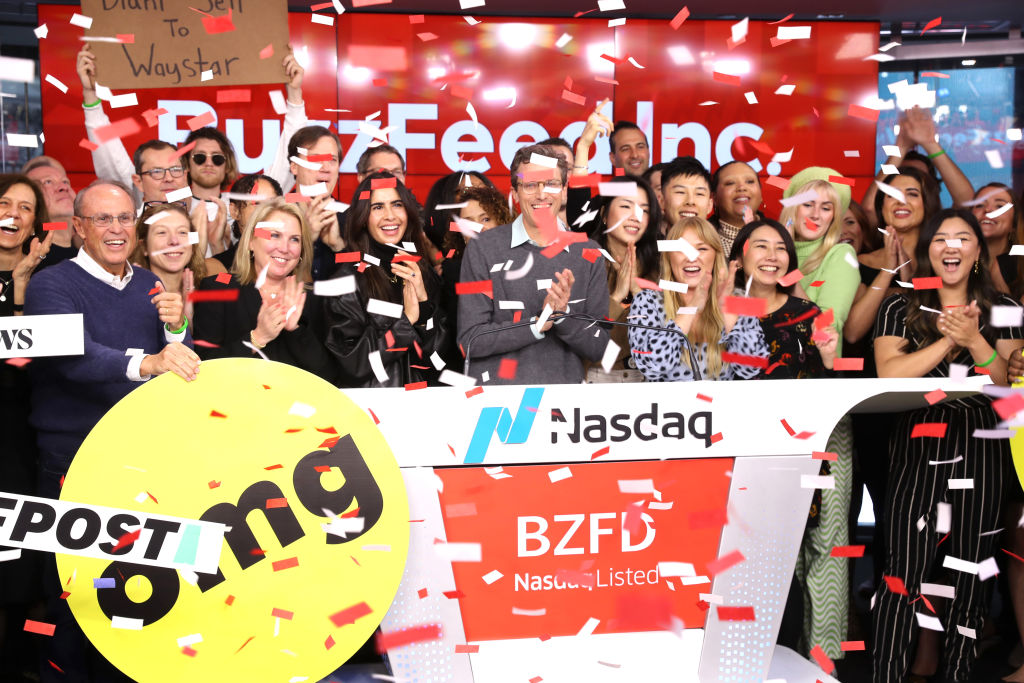Sink or swim: The peril of floating as an online media firm

The excitement surrounding Buzzfeed’s IPO was palpable. It had a loyal following of millennials, millions of investment, and a private-market value of around $1.7bn (£1.4bn).
Last summer, Buzzfeed founder and CEO Jonah Peretti said the float was about “taking the next step in BuzzFeed’s evolution, bringing capital and additional experience to our business”. He said going public would enable further growth and opportunities.
This excitement was short-lived.
Not only did shares plunge as much as 11 per cent in its Nasdaq debut, after its special purpose acquisition company (Spac) was met with a number of last minute withdrawals, but the stock has struggled to rally ever since.
The media behemoth is now worth around $215m (£180m), and shares are down nearly 70 per cent in the year to date.
Buzzfeed has been pushed to make tough decisions, cutting 1.7 per cent of its staff in January, according to a regulatory filing. It also laid off several dozen staff shortly after acquiring HuffPost in late 2020.
But it’s not just Buzzfeed who has felt the fading glow of the Spac rage.
Just last month Forbes u-turned on its own Hong Kong listing, citing “the deteriorating Spac market” as a key reason for the backtrack.
Meanwhile, talks of Vice Media’s own Spac didn’t materialise in the final months of 2021, as momentum continued to slow for cash shell companies.
Despite an initial boom during the pandemic, investors have grown increasingly sceptical about the vehicles, with the regulatory landscape becoming less receptive to the fanciful financial forecasting.
“Last year Spacs were the next big thing, now they’re the most hated thing”, Mirabaud TMT analyst Neil Campling told City A.M.
He said, if anything, the trend in the UK feels like it’s shifting more towards delisting, with industry titan Daily Mail and General Trust calling it quits in January after more than 90 years of trading on the London Stock Exchange.
But if online media firms are moving away from public listings, how else are they expected to grow?
Media expert at Enders Analysis Douglas McCabe reckons the major hurdle for online media publishers is hinged on the way media investors frame their investments and overall growth paths.
“The problem is that some investors think that content businesses are now tech businesses. So they want to see the scale of a tech business too”, McCabe told City A.M.
“Journalism businesses don’t “scale” like tech platforms: they are fundamentally ‘people businesses’”, he said.
LBG Media, owner of Ladbible, is perhaps an interesting example to look at.
Making its London AIM debut last December with a market cap of £360m, the company framed itself as a “multi-brand, multi-channel digital youth publisher”, with tech as a key tenet for this success.
For 2021, the firm had 63 billion views of its content, with a revenue of £54.5m ($75m). By comparison, Facebook’s parent Meta made around $118bn, with around three billion users.
While the companies are not directly comparable, what it does do is demonstrate the difference between online media publishers and social media when it comes to user and audience numbers translating into revenue.
In this way, investments in online publishers are always going to be underwhelming from a tech-hungry investor’s perspective when they simply can’t make the same returns as the social media or search engine big dogs like Meta or Google.
When you also throw in the added strain of advertising revenue for publishers, which have been squeezed as a result of recessionary pressures from both sides of the Atlantic, the growth path for online media publishers feels like it needs to be completely reimagined moving forward.
With this in mind, perhaps the safest route for expansion for publishers is to simply sell up.
This was the case when you look at Politico’s 2021 sale to Axel Springer for an estimated $1bn.
As Politico founder Robert Allbritton put it at the time: “It became steadily more clear that the responsibility to grow the business on a global scale, to better serve the audience and create more opportunities for our employees, might be better advanced by a larger company with a significant global footprint and ambitions than it could be by me as owner of a family business”.
The Athletic’s hefty $550m sale to The New York Times earlier this year seems to follow this pattern. Indeed, even with its million-strong subscriber base, the safer bet for the sports publication was to cash-in on its growth.
So, with IPOs at an effective standstill amid ongoing economic turmoil , online media firms need to decipher what growth looks for them and ultimately how it can, in a world of shrinking budgets and dwindling attention spans, rise to the top.